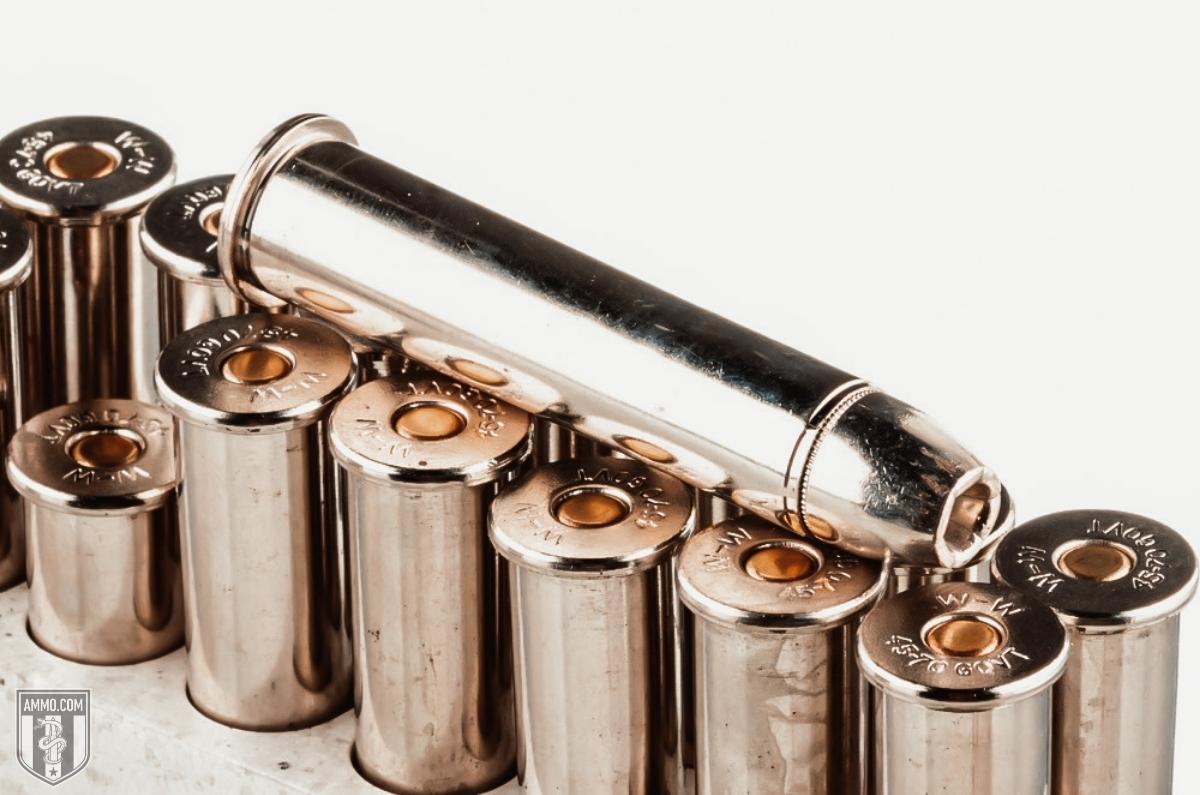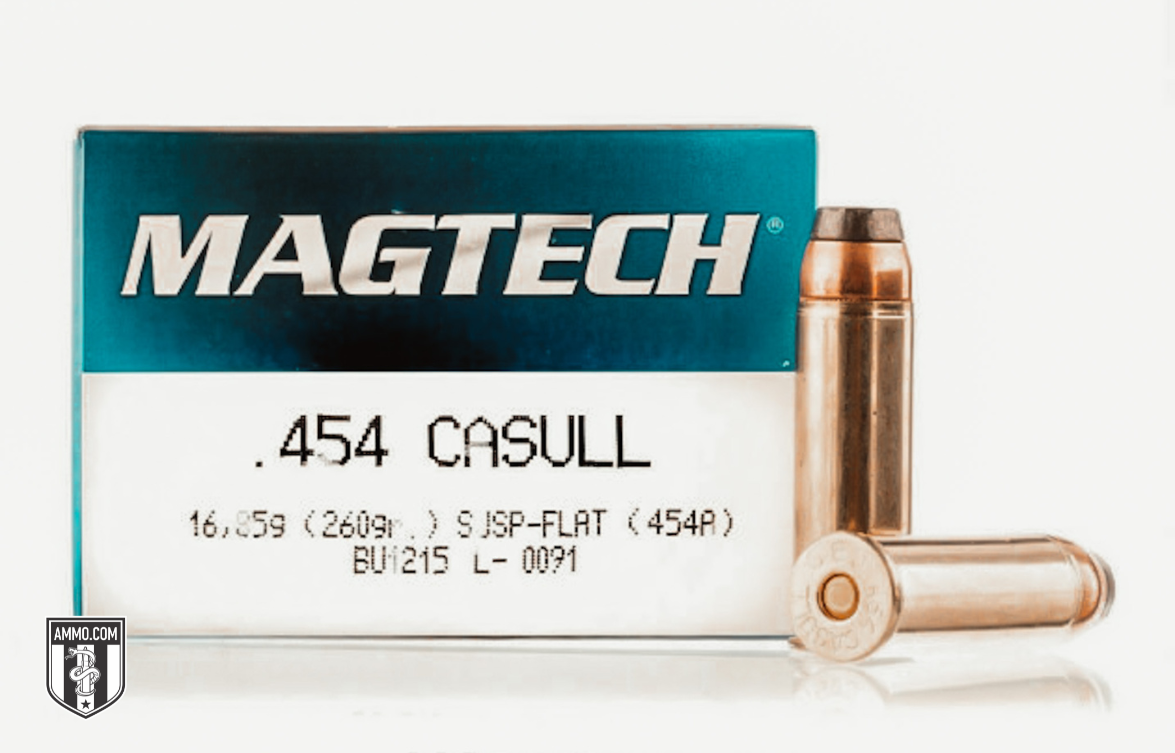454 Cassull vs. 45-70 Govt: Is One Better Than the Other?
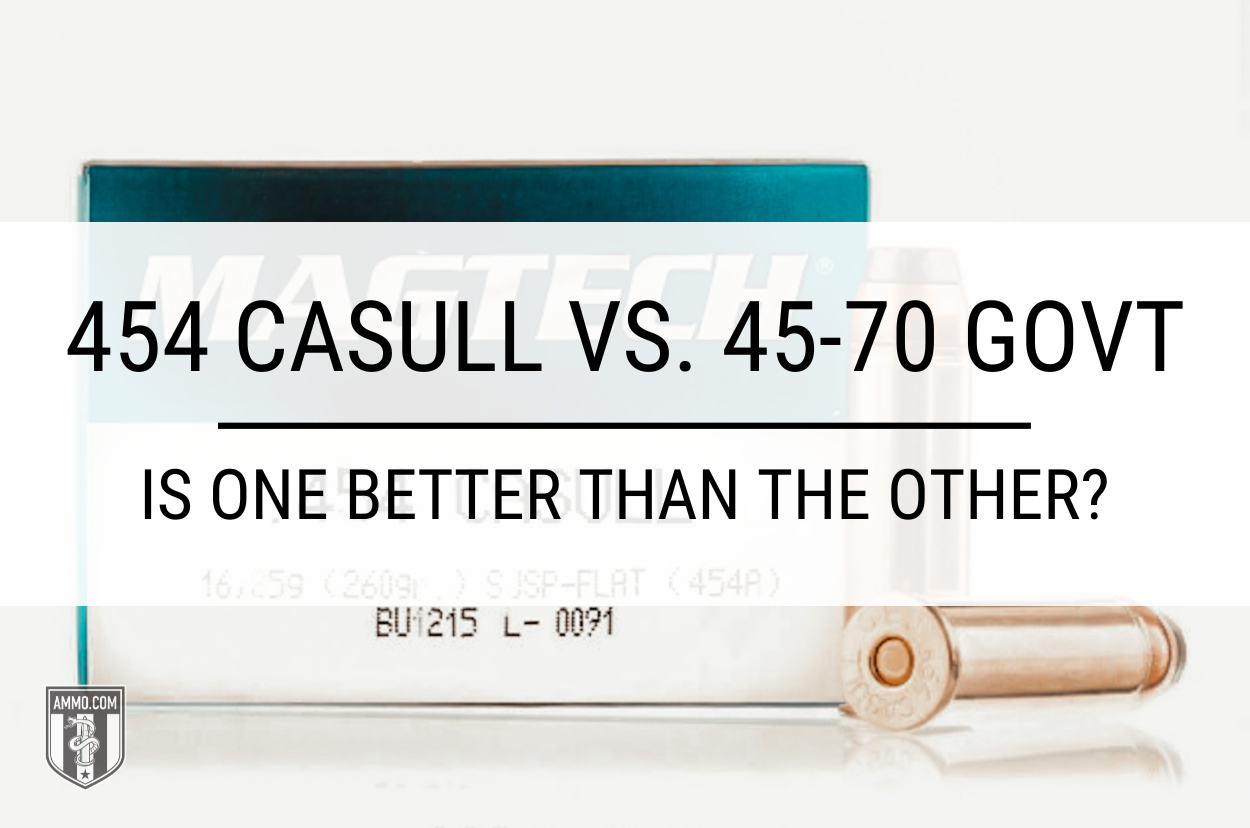
While both are large .45 caliber cartridges with rimmed cases, comparing the 454 Casull vs. 45-70 Govt is odd for one primary reason: the 454 Casull is a revolver cartridge, but the 45-70 Govt is a rifle cartridge.
As you continue reading this article, you’ll discover how their differences affect real-world performance, enabling you to choose the better cartridge for your situation.
What Are the Differences Between 454 Casull and 45-70 Govt?
I just touched on one of the significant differences between the 454 Casull and 45-70 Government; the 45-70 is a rifle cartridge, while the 454 Casull is a handgun cartridge. However, there are specific instances when the 45-70 Govt is chambered in a revolver (Magnum Research BFR), and the 454 Casull is chambered in a lever-action rifle (Rossi R92).
The cartridges have some similarities, which we’ll discuss in the specifications section. Then we’ll compare their recoil, trajectory, stopping power, and several other factors to help you determine which round is better for you.
Cartridge Specs
The 454 Casull is based on the 45 Colt. Its bullet diameter is 0.452”, and its neck and base diameters are 0.480”. Its case length is 1.383”, making the overall length 1.770”. Its capacity is 45.5 grains H2O. Thanks to the 454 Casull’s longer case, 45 Schofield and 45 Colt cartridges can both chamber in a 454 Casull firearm (but not vice versa).
The 45-70 Govt was a unique design, without a parent case. It uses a bullet with a 0.458” diameter. Its neck diameter is the same as the 454 Casull’s (0.480”), though its base diameter is wider (0.505”). The 45-70 case is significantly longer than the 454 Casull case at 2.105”, translating into an overall length of 2.550”. The 45-70 Govt’s case capacity is substantially larger at 81.8 grains H2O.
Some might be surprised by the maximum pressure difference. The 45-70 Govt has a max pressure of 28,000 psi – much lower than 65,000 psi for the 454 Casull.
Let’s see how these cartridges’ different specifications affect their relative performance, starting with recoil.
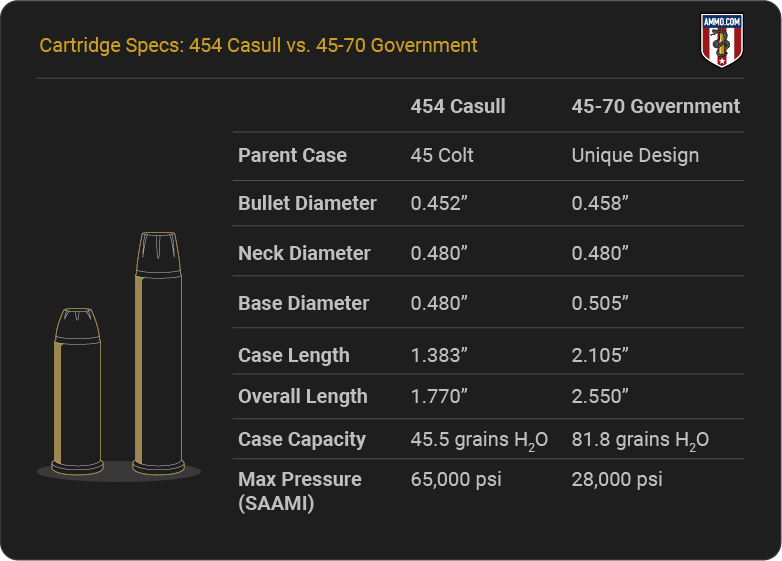
Recoil: 454 Casull vs. 45-70 Govt
When comparing cartridges, it’s wise to begin with their recoil. The cartridge that kicks harder is often more powerful and causes more muzzle rise, which can lead to less accurate follow-up shots.
The softer your firearm kicks, the less discomfort and fatigue you will feel. Gentler recoil can also help you avoid losing accuracy due to reflexive flinching.
“Felt recoil” is subjective. Two shooters may agree that one round kicks harder than another, but their agreement wouldn’t be measurable. “Free recoil” is the opposite. It can be calculated based on four variables: projectile weight, propellant weight, muzzle velocity, and firearm weight.
Both cartridges are known for their heavy recoil. The 454 Casull is thought to have more recoil than the 45-70 because it is most often fired from a revolver which is lighter and absorbs less recoil, whereas the 45-70 Govt is most often fired from a rifle. Truth is, the 45-70 Govt has more recoil than the 454 Casull. It just isn’t noticeable in most cases.
When firing a 260 grain bullet at 1,798 fps, with 16.85gr propellant from a 3.5-pound revolver (like the Ruger Super Redhawk Alaskan), the 454 Casull generates 27.58 ft-lbs of recoil energy.
When firing a 250 grain bullet at 2,025 fps, with 25.3gr propellant from a 4.5-pound revolver, the 45-70 produces 28.22 ft-lbs of recoil energy. When that same load is fired from a 7.4-pound rifle (like the Henry Lever-Action X Model), recoil energy equals 17.6 ft-lbs.
When fired from firearms of similar weights, these cartridges have nearly identical amounts of recoil energy. This section is a tie because the average shooter won't be able to distinguish between the two (unless they’re firing one from a rifle and the other from a handgun).
Trajectory
A projectile’s trajectory is its flight path as it travels downrange. It is often measured in inches of bullet drop or minutes of angle (MOA). A bullet’s trajectory typically resembles an arch, as it must rise and fall to compensate for the effect of gravity.
A flatter trajectory is generally preferred for firing across longer distances, because it requires the shooter to make fewer adjustments to remain accurate. Many factors contribute to a bullet’s trajectory, so the trajectory varies from load to load.
The 45-70 Govt isn’t known for having a flat long-range trajectory like the 6.5 Creedmoor or 308 Winchester. Neither is the 454 Casull. Even so, it’s challenging to compare the rounds apples-to-apples since one is a handgun cartridge designed for optimal performance within 200 yards (454 Casull), while the other is a rifle cartridge with an effective range of 1,000 yards (45-70 Govt).
When sighted in at 100 yards, a 454 Casull Hornady Backcountry Defense 300 grain bullet will drop -14.4” at 200 yards and -52.1” at 300.
When zeroed at 200 yards, a 45-70 Govt Hornady LEVERevolution 325 grain FTX bullet will drop -23” at 300 yards.
The 45-70 wins this section because it can have a flatter trajectory.
Accuracy: 45-70 vs. 454 Casull
A cartridge's accuracy depends on several variables, including the shooter, rifle, ammo, and atmospheric conditions. Too many factors are at play to declare one cartridge “more accurate” than another at close range. However, the 45-70 will be more accurate at longer distances thanks to its flatter trajectory.
The 45-70 wins this section because most shooters will find it more accurate at longer ranges.
Stopping Power
“Stopping power” is difficult to define because it means different things to shooters. We could argue about the definition forever. To complicate the issue further, shot placement is more critical than stopping power. A poor shot (e.g. to the foot) from a cartridge with more stopping power will likely prove less effective than a good shot (e.g. to the vitals) from a cartridge with less stopping power.
For the sake of time, let’s agree that penetration depth, wound column diameter (size of the hole created), and kinetic energy transfer are the primary determinants of stopping power. Since both rounds fire a .45 cal bullet (varying in diameter by a mere 0.006”), the wound column diameters will be virtually identical. This means penetration depth and kinetic energy transfer are the primary differentiators.
Penetration depth will ultimately depend on the type and weight of the bullet you choose. For example, a Hornady FTX (polymer-tipped bullet) typically penetrates deeper than a soft-point (SP) bullet, and a heavier bullet will penetrate deeper than a lighter bullet traveling at the same velocity.
Considering all this, the 45-70 typically has more striking energy. The 454 Casull has about 1,474 ft-lbs of energy at 100 yards, whereas the 45-70 Govt has about 2,049 ft-lbs of energy at 100 yards.
The 45-70 Govt generally has more stopping power than the 454 Casull, but neither is lacking in knockdown power.
Which Is Better for Hunting, .454 Casull or .45-70?
Both cartridges are often used for hunting. However, each one shines in differing scenarios.
The 454 Casull is better for hunting large and/or dangerous game like bears or moose at close range. The 45-70 Govt is better suited for a wider variety of game (e.g. deer, elk, and caribou) at moderate to long range.
The 45-70 Government edges out the 454 Casull because it offers hunters a little more variety and farther effective distances.
Defense
I would not recommend either cartridge for home or self-defense. They are far too powerful, more likely to endanger innocent bystanders by over-penetrating, and firearms chambered for them are cumbersome.
However, for bear defense, the 454 Casull is the better option. It wins this section.
Cost and Availability: 45-70 Government vs. 454 Casull
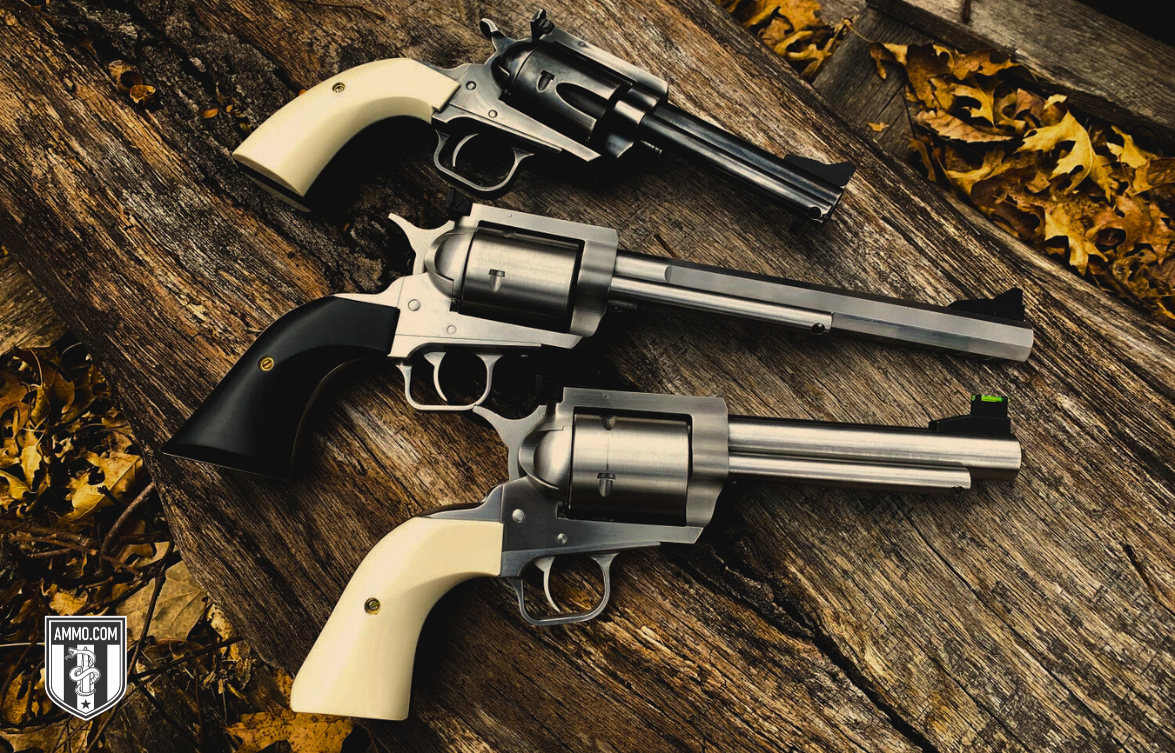
The cost of firearms and ammo for each cartridge are typically very similar. However, 45-70 is more abundant, as it’s more popular than 454 Casull.
The 45-70 Govt has a wider variety of firearms and more ammo options (although some of those options are much more expensive than the average 454 Casull ammunition).
The 45-70 Govt wins this section because it is more readily available than 454 Casull.
Reloadability
Reloading spent cases is a great way to save money on factory ammo. It also gives you more control over the quality of ammo you’re firing, because you can craft the perfect round for your firearm.
However, reloading is time-consuming and expensive because of all the required equipment and supplies. These hurdles often deter people from starting.
Many 454 Casull shooters claim you can get more reloads out of the 454 Casull cases, whereas the 45-70 Govt crowd argues that it is “so easy a caveman can do it.”
Both cartridges can be handloaded and have benefits that the other doesn’t, so this section is a tie.
Ballistics
The team at Ammo.com has gathered the ballistics for each cartridge so you can quickly compare them, below.
454 Casull Ballistics
Note: This information comes from the manufacturer. The actual ballistics obtained with your firearm can vary considerably from advertised ballistics. Ballistics can also vary from lot to lot within the same brand and load type.
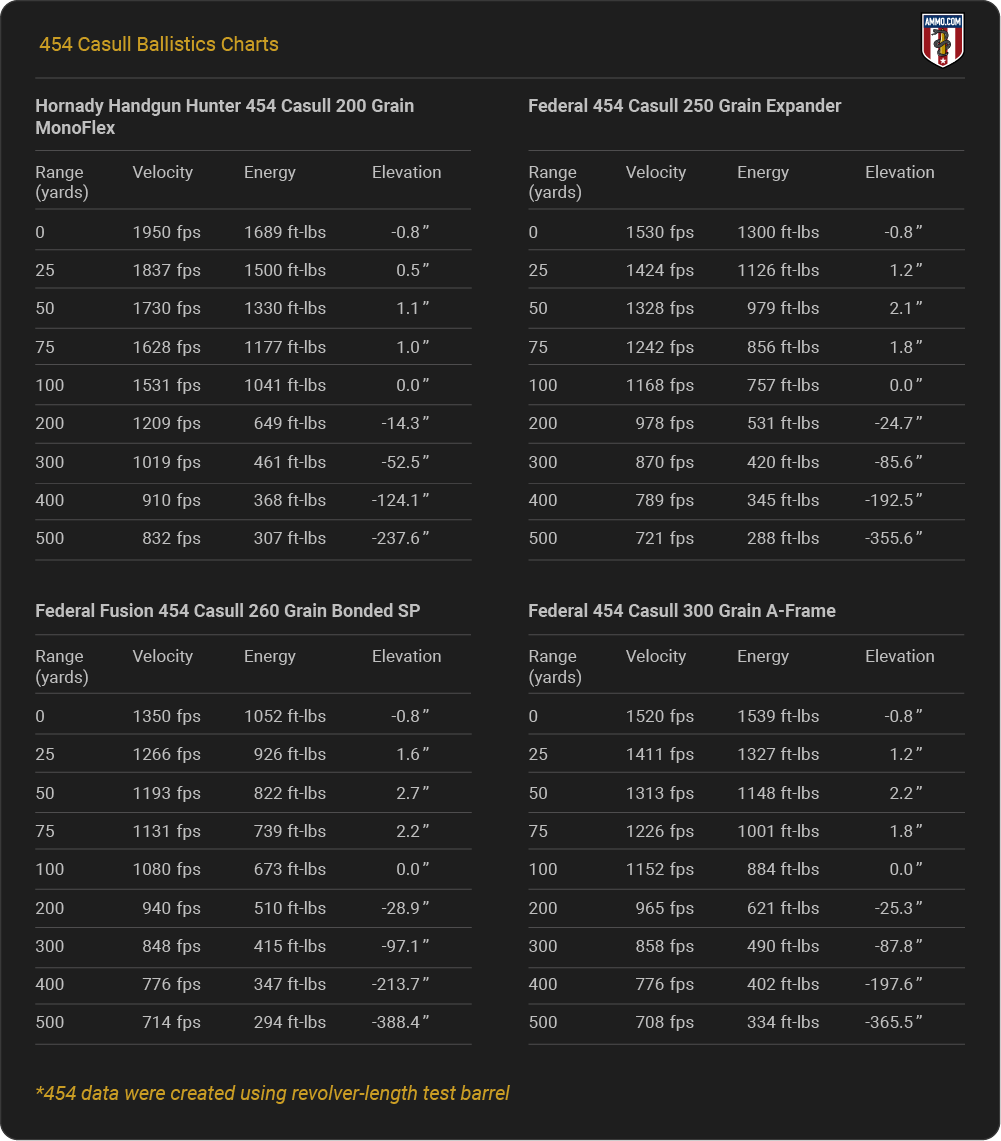
45-70 Ballistics
Note: This information comes from the manufacturer. The actual ballistics obtained with your firearm can vary considerably from advertised ballistics. Ballistics can also vary from lot to lot within the same brand and load type.
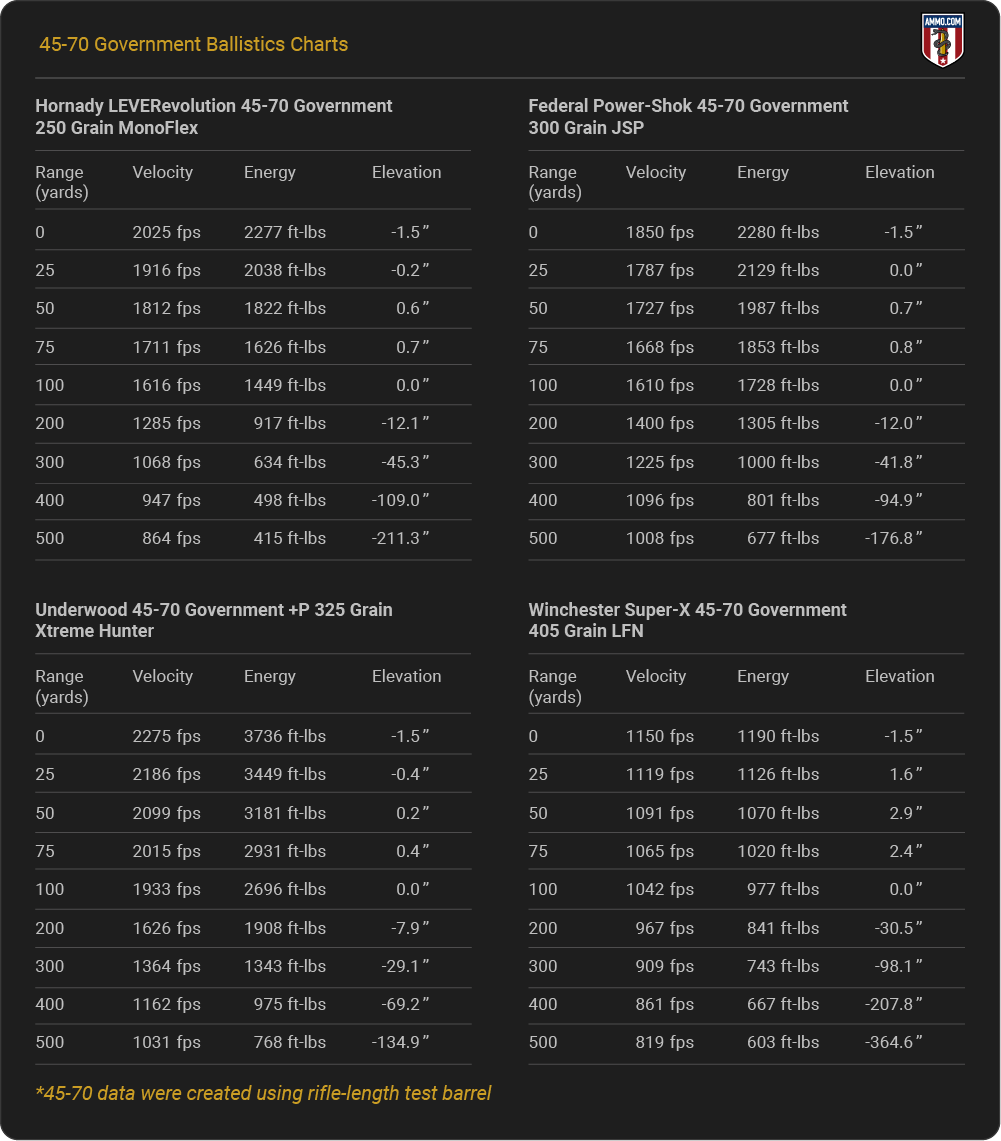
Take a deep dive into 45-70 Govt ballistics for factory loads.
454 Casull Brief History
The .454 Casull was originally a wildcat cartridge developed in 1958 by Dick Casull, Duane Marsh, and Jack Fullmer. In 1983 it went mainstream when Freedom Arms created a 454 Casull single-action revolver.
Several other firearm manufacturers followed suit, including Ruger and Taurus. However, it’s never taken off among the broader shooting community. It has a small but dedicated fan base, which keeps it just relevant enough for ammo and firearm manufacturers to continue production.
The 454 Casull is still a top choice for hunters and guides venturing into bear country, though few people enjoy regularly firing it due to its tremendous recoil.
45-70 Government Brief History
Released in 1873, the 45-70 was developed by the U.S. Army’s Springfield Armory for its new Model 1873 rifle which came to be known as the “Trapdoor.”
The 45-70 Trapdoor served as the primary rifle for the U.S. Army until its replacement by the bolt-action Krag–Jørgensen (chambered for 30-40 Krag) in 1893. Although the 45-70 only served the military for two decades, the cartridge has remained a favorite among big game hunters since its release and has seen extensive commercial success.
The 45-70 Govt made a name for itself as a potent guide gun cartridge and is frequently carried by hunters for protection in bear country.
Although many modern hunting cartridges have superior ballistics, there’s something satisfying about carrying a lever gun into the woods with the heavy-hitting 45-70 Government at the ready for any game that may cross your path.
Parting Shots
Now that you’ve finished reading this 454 Casull vs. 45-70 Govt comparison, you know that the 454 Casull won one section (bear defense), two sections were tied (recoil and reloadability), and the 45-70 won five sections (trajectory, accuracy, stopping power, hunting, and availability).
For most shooters and hunters, the 45-70 is the better option. But if you’re venturing into bear country, the 454 Casull shouldn’t be overlooked as a viable option for defense and handgun hunting.
Whichever you decide to go with, be sure to see what ammo is in stock at Ammo.com!
Frequently Asked Questions
The team at Ammo.com has answered the most commonly asked question regarding 454 Casull vs. 45-70 Govt.
What Are the Differences in Recoil and Stopping Power Between .454 Casull and .45-70?
The differences in recoil and stopping power between the .454 Casull and .45-70 are minimal. The 45-70 has slightly more recoil, but most shooters won’t notice a difference when firing the rounds out of similarly heavy firearms. The 45-70 also has more stopping power.
Will 454 Casull Stop a Grizzly?
Yes, 454 Casull will stop a grizzly with a properly placed shot.
What is the 454 Casull Comparable To?
The 454 Casull is comparable to .460 S&W, 44 Mag, and very few other powerful handgun cartridges.
Ammo Comparisons
- .308 vs 5.56
- 6.5 Creedmoor vs .308
- .300 Blackout vs .308
- .300 Win Mag vs .308
- .243 vs .308
- .308 vs .30-06
- 7mm-08 vs .308
- .270 vs .308
- 7.62x39 vs .308
- .223 vs .308
- .338 Lapua vs .308
- .380 ACP vs 9mm
- .223 vs 5.56
- .300 Blackout vs 5.56
- 9mm vs 45 ACP
- 9mm vs 40 S&W
- .357 SIG vs 9mm
- 10mm vs 9mm
- 9mm vs 9mm Luger
- .243 vs .270
- .300 Win Mag vs .30-06
- .270 vs .30-06
- .40 vs .45
- 38 Special vs 357
- 9mm vs 40 vs 45
- 5.56 vs 7.62x39
- 338 Lapua vs .30-06
- .30-30 vs .30-06
- 300 PRC vs 338 Lapua
- .30-06 vs 7mm
- 300 Win Mag vs 338 Lapua
- 300 PRC vs 300 Win Mag
- 300 WSM vs 300 Win Mag
- 338 Win Mag vs 338 Lapua
- 12 Gauge vs 20 Gauge
- 10mm vs 357 Mag
- .30-30 vs 7.62x39
- 224 Valkyrie vs 22-250
- 17 HMR vs 22 Mag
- 7.62x39 vs .300 Blackout
- 45 ACP vs 45 Auto
- 45-70 vs 30-30
- 300 Blackout vs 223
- 357 Magnum vs 9mm
- 350 Legend vs 300 Blackout
- 224 Valkyrie vs 223
- 45 ACP vs 38 Super
- 6.5 Grendel vs .308
- 17 HMR vs 22 LR
- 10 Gauge vs 12 Gauge
- 22-250 vs 223
- 45 Colt vs 45 ACP
- 350 Legend vs 30-30
- 5.7x28 vs 223
- 5.7 vs 9mm
- 5.56 vs 5.7
- 22 vs 9mm
- Buckshot vs Birdshot
- 450 Bushmaster vs 308
- 450 Bushmaster vs 223
- Buckshot vs Slug
- 6.5 Grendel vs 5.56 vs 223
- 6mm ARC vs 6.5 Grendel
- 44 vs 45
- 458 SOCOM vs 5.56
- 357 vs 44
- 32 ACP vs 380
- 300 Win Mag vs 338 Win Mag vs 338 Lapua Mag
- 450 Bushmaster vs 458 SOCOM vs 50 Beowulf
- 6mm Creedmoor vs 6.5 Creedmoor
- TMJ vs FMJ
- 44 Special Vs 44 Magnum
- 45 90 vs 45 70
- 6.8 Western vs 6.8 SPC
- 50 Beowulf vs 50 BMG
- 26 Nosler vs 6.5 PRC
- 28 Gauge vs 410
- 6.8 SPC vs 5.56
- 6.8 SPC vs 6.5 Grendel
- 6.8 Western vs 7mm Rem Mag vs .28 Nosler
- 6.8 Western vs 6.5 Creedmoor
- 22 Hornet vs 223
- 6.8 Western vs 6.5 PRC
- .410 vs 12 Gauge
- .410 vs 20 Gauge
- 22 LR vs 22 Mag
- 6mm ARC vs 243
- 7mm-08 vs 270
- 243 vs 6.5 Creedmoor
- Nickel vs Brass Casing
- 204 Ruger vs 223
- 50 Beowulf vs 5.56
- 260 Remington vs 6.5 Creedmoor
- 6mm Remington vs 243
- 28 Nosler vs 300 PRC
- 50 Beowulf vs 50 AE
- 22 Nosler vs 22-250
- 450 Marlin vs 45-70
- 300 Win Mag vs 300 Norma
- 458 SOCOM vs 300 Blackout
- 38-55 vs 45-70
- 22 Hornet vs 22 LR
- 300 Norma vs 338 Lapua
- 338 Lapua vs 50 BMG
- 28 Nosler vs 300 Win Mag
- 28 Nosler vs 6.5 Creedmoor
- 204 vs 22-250
- 458 SOCOM vs 45 70
- 44 40 vs 45 70
- 6.8 SPC vs 6.5 Creedmoor
- 450 Bushmaster vs 30-06
- 7mm Rem Mag vs 300 Win Mag
- 30 Carbine vs 223
- 25-06 vs 30-06
- 26 Nosler vs 28 Nosler
- 16ga vs 12ga
- 30 06 vs 7.62 x54R
- 9mm Makarov vs 9mm Luger
- 350 Legend vs 223
- 30 Carbine vs 5.56
- 6.5x55 vs 6.5 Creedmoor
- 6.5 Creedmoor vs 270 vs 25-06
- M193 vs M855
- 450 Bushmaster vs 458 SOCOM
- 6.5 Grendel vs 6.5 Creedmoor
- 350 Legend vs 5.56
- .277 Fury vs 6.8 SPC
- 277 Fury vs 300 Win Mag
- 10mm vs .45 ACP
- 277 Fury vs 223
- 6.8 SPC vs 300 Blackout
- 6.5 PRC vs 6.5 Creedmoor
- 277 Fury vs 308
- 277 Fury vs 6.5 Creedmoor
- 350 Legend vs 450 Bushmaster
- 277 Fury Vs 5.56 NATO
- 10mm vs 40S&W
- 32 ACP vs 9mm
- 32 Special vs 9mm
- 8.6 Blackout vs 300 Blackout
- 30 Super Carry vs. 9mm
- 5.56 vs 9mm
- .50 Action Express vs 9mm
- 7.62x25 vs. 9mm
- 10mm vs 44 Magnum
- 300 Blackout vs 300 Win Mag
- 6.5 Grendel vs 300 Blackout
- 460 Rowland vs 10mm
- 300 RUM vs 300 PRC
- 300 Norma vs 300 PRC
- 45 GAP vs 45 ACP
- 7mm PRC vs 300 Win Mag
- 300 PRC vs 6.5 Creedmoor
- 300 PRC vs 308
- 357 SIG vs 357 Mag
- 7.62x39 vs 7.62x51
- 243 Win vs 223 Rem
- 30 Nosler vs 300 PRC
- 6.5 Creedmoor vs. 30-06 Springfield
- 450 S&W vs. 44 Magnum
- 6.5 Creedmoor vs. 300 Win Mag
- 454 Cassull vs. 45-70 Govt
- 454 Cassull vs. 44 Mag
- 7.62x54r vs. 308 Winchester
- 22 ARC vs. 223 Rem
- Subsonic vs. Supersonic Ammo
